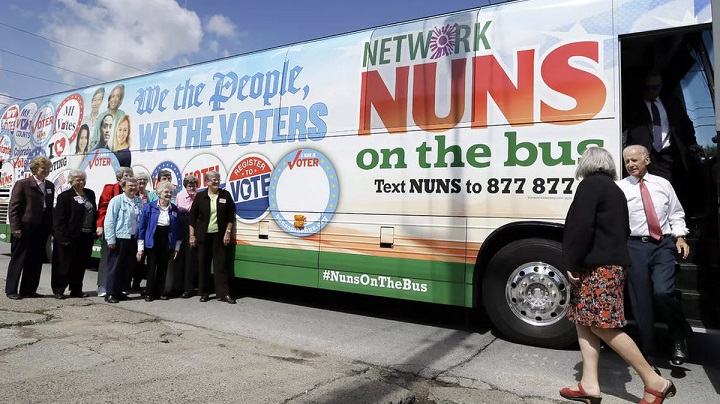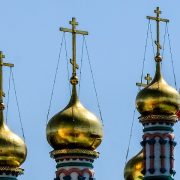
It is one of the best kept secrets of politics in the United States that whoever wins the Catholic vote wins the elections.
Ever since John F. Kennedy, Catholics have voted for the winner in 12 out 15 presidential elections and the other 3 were just about too close to call- Reagan, Clinton, Bush, Obama and Trump all won the Catholic vote in important electoral contests. Some political scientists argue that this is because Catholics, who make up about a quarter of the US population, are so copious in their diversity- in terms of education, income, age, race, gender, and even religious and political beliefs- and so integrated into American life that the trends and spread of their vote simply mirrors that of the nation as a whole.
There is, therefore, no clearly defined “Catholic vote” in the US as there may be a Mormon or Evangelical one (who tend to vote Republican), or a Black, Jewish or Secular one (who tend to vote Democrat). And yet, the recent swings in Catholic votes do not simply represent national trends- they are also driven by important internal religious dynamics, which are themselves revealing of the contemporary state of Catholic political life and which tell us much about how and why and to what purpose Catholicism has become, surprisingly, so central in these last weeks of the electoral campaign.
Abortion Politics: Obama, Hillary, Trump
So what are the chances that Joe Biden can recuperate the Catholic voters who supported Obama in 2008, began to slide away from him in 2012, and who then decisively turned on Hillary Clinton in 2016? There is a strong case to be made that Trump would have lost the elections in 2016 if Hillary would have just picked up a few thousand Obama Catholic voters in Pennsylvania, Michigan and Wisconsin. Tracking that slide from 2008, therefore, tells us a lot about the state of Catholic politics in the US and Biden’s chances of winning the elections next week.
Obama came into office in 2008 with relatively strong Catholic sympathy, both in the US and, even more so, outside of it. In 2009 he was invited to give a commencement speech at the University of Notre Dame, the most prestigious Catholic University in the US, and a meeting point for its multiple intellectual currents and religious trends. A vocal number of students and professors protested the invitation on the grounds of Obama’s support for abortion. Obama came to Notre Dame ready, armed with a typical, powerful first year speech, in which he addressed abortion head on, acknowledged his differences with the audience, and then sought common ground with pro-life Catholic intuitions by lauding the public role of faith in politics and ending with an appeal to everyone’s better angels.
Over the next year, as Obama sought to mobilize votes in congress to pass his signature Health Care bill- i.e. Obamacare- the success of its passage came down to a group of Catholic Democratic congressmen- the “Stupak 12”- who voiced opposition to the bill’s abortion provisions, which had originally proposed federal financing for abortion procedures. The congressmen eventually made a deal with Obama to issue an executive order which applied the so-called Hyde Amendment- which prohibits Federal US Funding for abortions- to Obamacare.
The decision was a tortured one for the Catholic congressmen- both in conscience and in voter strategy. The US Catholic Bishops had supported the passage of a more robust healthcare platform for decades as a major policy item, and many Catholics organizations and associations rallied for Obama’s healthcare bill. But the Bishops balked on the abortion provision, as did many others, and were skeptical that the Democrats would keep up the bargain. It took 11th hour haranguing and a call from Notre Dame’s former titan of a president, Fr. Ted Hesburgh, to convince the Stupak 12 to vote for the bill.
The knives came out in the aftermath of the bill’s adoption, and the Stupak 12 lost the support of both their voters and the Democratic Party. Half of the pro-Stupak democrats lost their seats in the midterm elections of 2010 because of their support for the healthcare bill. And after the passage of Obamacare, the administration took a harder line against Catholic policies on the reproductive front. In 2011, a new Obamacare mandate legally required employers to provide health insurance policies for their employees which would include provision of contraceptives.
The mandate made exceptions for a small set of religious communities that, notably, did not extend to Catholic schools, universities and other diocese-run programs. Fr. John Jenkins, the current President of Notre Dame who had defended the school’s invitation to Obama became the most prominent and public Catholic University to file a federal lawsuit against the mandate. Jenkins, justifying the lawsuit in an Op-Ed in the Wall Street Journal, laid out the case as a violation of religious freedom.[1]
A number of important Catholic political dynamics are captured in this episode even as it hides a number of others. Critically, it ratcheted up the culture war rhetoric among a number of Catholic intellectuals, particularly on the conservative Catholic right (but not only) and fed its current, post-John Paul II, post-Benedict XVI, anti-liberal pessimism. That pessimism found confirmation in Hillary Clinton’s 2016 campaign, which saw the adoption, for the first time, of a Democratic platform which explicitly rejected the Hyde amendment, and effectively overturned Bill Clinton’s slogan of making abortions “safe, legal and rare” – a formula that Obama and others had held up as a place where Catholics and Democrats could work together.
To the growing anti-liberal Catholic intellectual right, this confirmed the feeling that any synthesis between Catholicism and liberal modernity was either a chimera or had been fundamentally broken and that secular liberals had won the anti-Christian battle, and were now within reach of using the state to dominate, manage or criminalize conservative religious beliefs. Leaked campaign emails caught Hillary’s lieutenants dreaming of torching off a “Catholic Spring” (before pundits had switched to calling it an Arab Winter).
The phrase caught the sense of an axe-to-grind, bared hostility that various Catholic intellectuals had suspected animated democrats all along, one which viewed the Church as an authoritarian obstacle of Mubarak or Gaddafi-like proportions that needed to be torn to the ground.
Its within this interpretation, I think, that you get the swift re-evaluation currently en vogue of the intransigence and anti-modernism of pre-war, anti-liberal Catholic Europe which had been discarded at Vatican II in favor of a Kairos-full vision of modernity. It is in here, in this environment, that you get the new Catholic Nationalism and accusations levelled against the rising “totalitarianism” of cosmopolitan international elites.
Biden and the Nuns-on-the-bus
This is a powerful story – it is the story of philosophers, the story of history as ideas, of ideologies countered and combatted. In this story, Joe Biden is a wolf-in-a-sheepskin kind of a figure – his accommodations to secularism must be called out and rejected – he must be publicly refused the Eucharist and shamed that he has cast his soul in mortal danger- as Cardinal Raymond Burke, i.e. “Fr. Dubia” recently wrote.
One of the vulnerabilities of the history of ideas approach to things is that it often ignores sociology. In this case, it has missed the lived religious reality that stands outside its categories. It also often over-reflects the interests of its partisans rather than the whole of society. In this case, it over-represents the interests and fears of the university, business and social elites of US Catholicism, who are overwhelmingly not working class or Hispanic or democratic.
Joe Biden is much more of a lived-religious-reality Catholic than a history-of-ideas one. And, as such, Biden doesn’t fit into the slide story of polarization I’ve just sketched out above, which has driven recent Catholic intellectual animus against the Democratic Party. In fact, I would argue, Biden remains a familiar figure to most American Catholics and most American parishes still have guys like Biden in their pews on any given Sunday. While he may not have much in the way of a political theology, Biden talks about faith in plain, simple, unforced terms – sometimes with remarkable spiritual elegance – as in these interviews about prayer and church and the death of his son.

Critically, its difficult to pin Joe Biden as hostile to Catholicism or holding hidden secular designs. He supported the Hyde Amendment for his entire political career until they re-wrote the Democratic platform to make it a requirement to not do so. He gleefully hung out with the nuns-on-the-bus who supported the passage of Obamacare.
He did not make abortion the center of his campaign, and his famous support for gay marriage in the US, which leaped ahead of Obama in classic Joe Biden style, was couched in the language of warmth, dignity and respect that has marked Pope Francis’ recent words on it. He’s surrounded himself with old Catholic advisors, consistently talks up Catholic friendly themes on poverty, immigration, healthcare and race. His campaign has been characterized by intelligible religious outreach, and, even better, a coordinated absence of religious hostility by mainstream Democrats to religious conservatives, as the Amy Coney Barrett hearings have just shown in remarkable fashion.
There’s good reason to think that this strategy could work, especially in the blue-collar, post-industrial Midwest cities where Joe Biden came from and where Catholic communities are still important and where this election hangs in the balance. Recent polls hint that Trump is doing less well among Catholic voters than in 2016 – with white Catholics edging towards Hispanic Catholics in their support for Joe. I’m placing bets that he’s going to win the Catholic vote all across town and win the election in doing so.
***
For the last 20 years, an important process of religious sorting has occurred in the US, to the point where religious service frequency has become one of the most important predictors of partisan voting patterns, including among white practicing Catholics. The nature of this sorting has been bad for polarization, bad for the culture wars, bad for the US and bad for the Catholic Church in general.
There’s been a lot of chatter about the promise of Biden’s candidacy to install a healer-in-chief in the White House, to pull the US back from its polarized edge, to think about the country in terms of unity and how to redirect energies towards repairing a common civic vision.
Joe’s an old man, and I’ve misplaced my hopes before, but I am rooting hard for him, and like to think a Biden presidency might help re-orient American Catholic energies, too, cut off some wind from the sails of the culture wars, and open up some space to reach for a better way to live our religious pluralism, one that’s neither Carl Schmitt nor Catholic Spring but fundamentally inspired by human fraternity, social love and spiritual solidarity.
- Michael Daniel Driessen is Associate Professor and chair of the department of Political Science and International Affairs at John Cabot University (Rome).
[1] Its been a long run for Jenkins who may, perhaps unfairly, go down being remembered not for his support for Obama, or his defense of religious freedom but because he caught Covid at a White House party for Amy Coney Barrett- a Notre Dame law professor- where he didn’t wear a mask.





